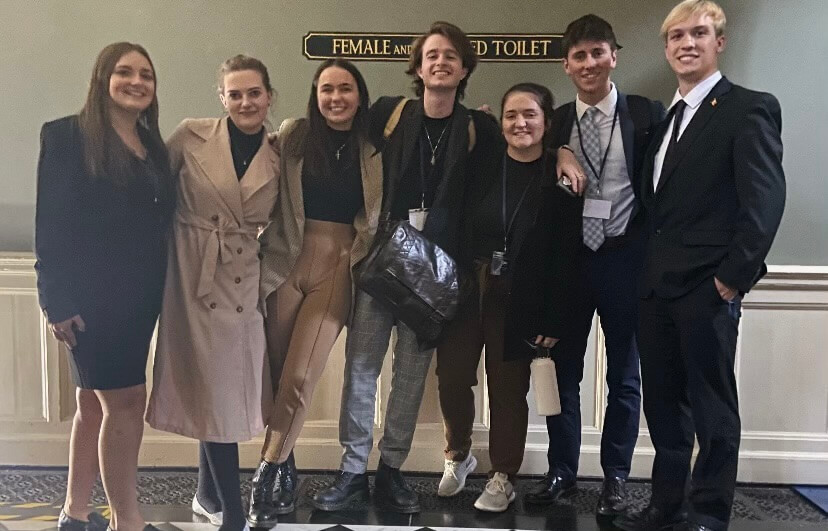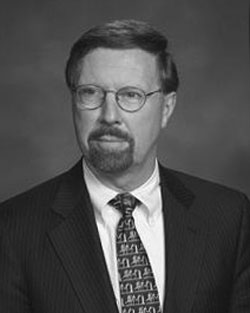Monmouth’s Model United Nations debate team crowned the busy fall competition schedule with a third-place win for their North Korean and Argentine delegations at the National Model United Nations Conference in Washington, D.C. on Nov. 10 to Nov. 12. This was a great accomplishment given the size and level of the competition.
The winning North Korean delegation featured Political Science junior Matt Boyle, senior Aaron Nitzberg, sophomore Brendan Sheehan, sophomore Destiny Goodfriend, senior Tom Rosta, and sophomore Veronica Belloso. It also featured Psychology senior Caroline Boyle and Business Economics sophomore Erin Mikell.
The Argentina delegation featured Political Science seniors Joseph Kirchman and Taiphane Orange; sophomores Michelle Rymar, Patrick Carbone, and Jack Bradshaw; junior James Bellinger; freshmen Giavanna Cangialosi and Alyssa Taylor. It also featured Business Economics sophomore Ryan White and freshman Paris Galgano, as well as Social Work junior Lilly Pardey and Criminal Justice freshman Zulmy Lozano.
In October, the Model UN team consisted of Lilly Pardey (SW, Jr.), Brendan Sheehan (PS, Soph.), Destiny Goodfriend (PS, Soph.), Erin Mikell (BE, Soph.) Owen Bros (PS, Soph.), Maria Sower (PY, Jr.), and Matt Boyle (PS, Jr.) and traveled to Oxford to compete in the annual Oxford University Model UN Conference, something that the team traditionally competes in. While Monmouth took first place last year, this year, the team did not take home any titles. The team’s advisor, Professor Ken Mitchell, said, “[There were] strong performances by everyone. It’s a super competitive contest.” The students also served as the only American students out of approximately 500 global participating students.
At Oxford, the candidates were assigned to “committees” such as the World Health Assembly, the UN Environment Assembly, and the UN Human Rights Council. Pardey, who was on the World Health Assembly for the conference and acted as the University’s head delegate, debated representatives from other schools on how the UN should encourage development of public healthcare systems and improving access to safe reproductive health care in the LDCs (least developed countries) and beyond.
Sheehan and Goodfriend were on the United Nations Environment Assembly where they debated “Developing and International Protocol For Response To Climate Change-Induced Disasters” and “Addressing Cross-Border Waste Management.” Meanwhile, Mikell and Bros, on the Human Rights Council, debated “Combating Discrimination Based on Religion or Belief in the Public Sphere” and “Addressing the Problem of International Human Trafficking Networks.”
The students who participate mostly have related majors, but anyone can join the team. Sheehan said, “I’m a political science student and sort of got sucked into the debate/Model UN realm. Freshman year, I went to Washington, D.C., and Harvard University for Model UN and was then selected to go to Oxford for [my sophomore year].”
The team started by leaving New Jersey late at night on Oct. 25 and arriving in London 12 hours later. They then took a two hour bus ride from London to Oxford and received a tour of the University with Ken Mitchell, Ph.D., Professor of Political Science and Sociology, faculty advisor of Model UN, and an alumni of Oxford. The next day the group had opening ceremonies with the Ambassadors to the UK from both Greece and Switzerland. Then, the students began their committee sessions.
That night they had a formal dinner, which consisted of a candlelit three course meal in a historic Oxford building, as part of the social package of the conference. The next day was the longest day of the conference, and out of the 21 members of the committee, two groups, or “blocs,” of ten were formed to work on two different resolutions to the topic.
Sheenhan explained his role in the process and said, “I had added provisions to both papers and would have to make a tie breaking decision on which resolution would pass and which wouldn’t.” The next day, the group voted on the two resolutions, and Sheenhan made a tie-breaking decision in committee. After they passed their resolutions, they gaveled out of committee and went to the closing ceremony of the conference. The next morning, the group boarded the bus for London and flew back to the United States. “Overall, it was the best experience of my college career, and I’m so grateful I had the ability to go,” added Sheenhan.
If any other Monmouth students wanted to join Model UN, according to Mitchell, they could start by joining the club which will participate at the Washington, D.C., and Harvard Conferences. Monmouth’s Model UN takes a large group of 30 students to each conference. Students who go and perform well often get asked later to join the competitive team that travels to the UK at Oxford.
The goal with the UK trips is to compete and try to win awards; the goal at the Washington, D.C.. and Harvard Conferences is to introduce Monmouth students to Model UN and to have fun with the experience. “Much like how Monmouth has intramural basketball and NCAA competitive basketball, this is how the Model UN program operates.,” Mitchell explained.
MU as an institution offers its students only a few opportunities to “compete academically” against other students, and it has been Mitchell’s hope over the past eight years that Monmouth’s Model UN can provide an opportunity for students who are looking for experiences like this.
Of joining Model UN, Sheehan said, “It may seem like it’s not your thing or daunting or nerdy, but it’s actually really chill. It’s a really unique experience to meet all of these people and discuss an interesting topic in committee and go to restaurants or clubs or tourist spots with your new friends after. I would say give it a shot because it’s the most popular extracurricular in the US and attracts all majors.”


